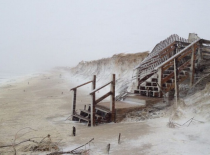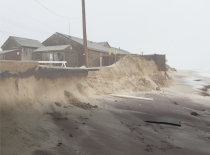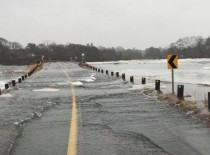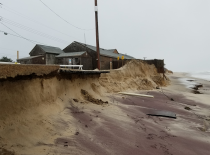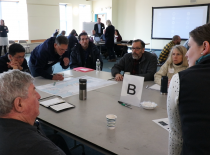Category: Climate
The Town of Eastham has partnered with the Cape Cod Commission to develop a municipal climate action plan. This plan builds on Eastham's ongoing planning efforts, including its hazard mitigation plan, participation in the state's Municipal Vulnerability Preparedness Program, and involvement in the Cape Cod Commission’s Low-Lying Roads project. The Cape Cod Climate Action Plan identifies municipal climate action planning as a critical strategy to support local adaptation, mitigation, and resiliency mea
The Cape Cod Commission has developed a set of model wetlands and zoning regulations to mitigate and adapt to coastal changes. These new regulations build upon the existing coastal resilience bylaw and set higher standards for zoning regulations than those required by FEMA’s National Flood Insurance Program. They also create cohesive local regulations and permitting across various boards and commissions.
This spring, Cape Cod Commission staff completed the Low-Lying Roads project, identifying priority low-lying roadway segments susceptible to coastal storm flooding and preparing conceptual improvements for prioritized locations in all 15 Cape Cod towns.
Thirteen Cape Cod high school students are now better prepared to combat climate change after completing the Cape Cod Commission’s Climate Ambassador Program, an initiative to educate, engage, and empower young people on Cape Cod to work together to address the challenges of climate change.
The Cape Cod Commission’s Low-Lying Roads project is coming to a close this year. Since it was initiated in 2022, the project has identified roadways in the region most vulnerable to flooding from the combined effects of sea level rise and storm surge. Commission staff and contractor Woods Hole Group, working individually with each town, prioritized roads using a combination of state-of-the-art modeling and community engagement.
The fourth cohort of the Cape Cod Commission’s Climate Ambassador Program will begin on January 31, 2024. Sixteen students representing six Cape Cod school districts have been selected to participate in this year's program. The participants have identified interests in all facets of climate change including education, policy and politics, local issues, and how to use art to convey climate-related concepts.
In 2021, the Commission began work on the Low-Lying Roads Project, an effort to assess and analyze the region’s low-lying roads and to devise solutions that towns can implement to increase their resiliency in the face of increased climate impacts. The project will be complete in 2024, with vulnerable roads identified and solutions presented in all 15 Cape Cod towns.
A new version of the state’s Municipal Vulnerability Preparedness Program is now available to towns statewide.
The Cape Cod Regional Transit Authority is embarking upon an effort to electrify its fleet. A comprehensive study conducted by Hatch Associates Consultants maps out a 12-year electrification plan that could significantly reduce the fleet's greenhouse gas emissions.
The Cape Cod Commission is pleased to invite Cape and Islands students in grades 9-12 to apply for the Climate Ambassador Program. The Program is an initiative to educate, engage, and empower young people on Cape Cod to work together to combat the impacts of climate change. Applications are due by midnight on December 22, 2023.

